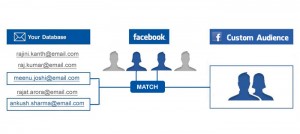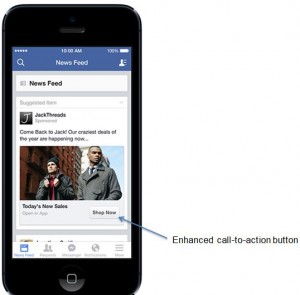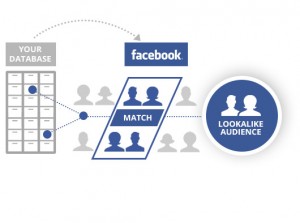Apr
2015
Reaching the Right People: Facebook Features That Harness Privacy Concerns
The benefits of Facebook advertising have been argued upon, with some stating that it is a highly effective method for reaching targeted online communities (Tuten, 2008) and others sceptical about the level of privacy it provides the online user with due to the platforms ability to access a high level of user information (Truong & Simmons, 2010).
The aim of this blog is to provide an insight into two Facebook advertising features which have been criticised for harnessing privacy concerns, but that could, however, help local authorities and councils to reach out to the right people. My previous blog focuses on Facebook advertising best practice guidelines, if you are interested, please find it here.
Custom Audiences
Custom audience targeting is a feature which has recently been introduced by Facebook that allows you to target your advertisements to a specific set of people who you have already established a relationship with on or off Facebook (Facebook, 2015).
Let’s say that you have a selection of email addresses or phone numbers of people who have displayed an interest in becoming a foster carer. These details could have been captured from a fostering event, for example. You can then upload this list of email addresses or phone numbers to Facebook, and if the contact details match the details on the user’s profile, Facebook will deliver your ads to those people. It is important to remember, however, that the list needs to include at least 100 people and that the larger the audience size, the more successful the campaign is likely to be (Facebook, 2015).
Source: Facebook, 2015
The custom audience feature means that you when you target your adverts, the call to action button will become enhanced, therefore increasing both the likeliness of catching the attention of the user, and the likeliness of that user converting (B&T, 2014).
Source: Facebook, 2015
By using custom audiences, you are able to reinforce your messaging to an audience of users who have already displayed an interest in becoming a foster carer. This, therefore, impacts on the level of engagement and the rate of conversion (Jon Loomer, 2014).
For advertisers that would like to find out more about Facebook custom audiences, please click here.
Lookalike Audiences
Creating a lookalike audience can be an effective accompaniment to custom audiences. The feature allows you to reach new people who may be interested in becoming a foster carer by utilising attributes such as interests or demographics, which are possessed by people in your custom audience list, fans of your Facebook page or visitors to your website (B&T, 2013).
Simply put, lookalike audiences let you use information you already have to reach a more interesting audience through the following sources:
- Custom audience list: This allows you to show your adverts to people who resemble the people whose email addresses or phone numbers you have;
- Page fans: This allows you to target people who look like fans of your page but who do not yet know about your organisation;
- Website visitors: This allows you target people who are similar to visitors who have visited your website, visitors who have visited a specific section of your website and visitors who have visited a specific page on your website.
Source: Facebook, 2015
The success of lookalike audiences, however, is highly dependent on the sector in which the organisation operates in. Let’s take the retail sector for example, the likeliness of a consumer converting who shares similar characteristics on Facebook to an organisation’s current customer base is relatively high, therefore lookalike audiences for the retail sector have harnessed many benefits (Loomer, 2014). For the recruitment of foster carers, it is difficult to assume that a user who possesses similar characteristics to those from the above three sources has an interest in becoming a foster carer; therefore it is far more complex.
Based on this, a recommendation for implementing lookalike audiences in order to reach out to potential foster carers would be to split test the three sources discussed above. Create one advert and target it at three different lookalike audience types: 1) Those who are similar to your custom audience list 2) Those that are similar to users who have liked your page 3) Those that are similar to visitors who have visited the fostering section of your website. From this, measure which of your three lookalike audiences are generating the most enquiries and which are not in order to understand which of your lookalike audiences are the most effective at helping to reach your goals.
For advertisers that would like to find out more about Facebook lookalike audiences, please click here.
Privacy Concerns
The ability to collect a large amount of personal data from users and use this data to target marketing appeals, however, has increased the privacy concerns of users. Users may perceive the personalised advert content as appealing and aligned with their interests, or they may view it as off-putting if they believe that their privacy has been violated (Tucker, 2014).
If users feel that their privacy is being invaded, it is likely to lead to “reactance”, which is a motivational state in which a user resists something that they find forced by behaving in the opposite way to intended (Tucker, 2014).
There are mixed opinions on the use of custom audiences and lookalike audiences, with some stating that the targeting options are an invasion of user privacy and others stating that an email address is no less sensitive than the data which is accumulated with partner categories, such as buying histories, lifestyle and home ownership status (Loomer, 2012).
Recommendations
Heightened user privacy concerns and user reactance should be viewed upon as highly important aspects to address. The type of advert content implemented is a key method for distilling away from appearing intrusive. For example, messaging such as ‘Are you considering fostering?’ or ‘Interested in fostering but worried about taking the next step?’ would be effective at softly communicating the key message and decreasing the chances of user reactance.
The changes to alter user privacy concerns also need to be made my Facebook. Its current privacy policy contains an overwhelming amount of information, which would benefit from being condensed into a presentable, user-friendly document. Although many Facebook users may still refrain from reading the policy, clear communication of its privacy practices is vital (O’Brien & Torres, 2012).
Concluding Points
Both custom and lookalike audiences are beneficial methods for local authorities and councils seeking to recruit foster carers, due to their ability to increase the chances of reaching out to the right people. If choosing to implement custom audiences it is important to remember that you need at least 100 contact details (Facebook, 2015). If choosing to implement lookalike audiences a suggestion is that you split test all three available sources in order to determine which audience gains foster carer enquiries and which audience does not.
It is, also, vitally important to remember that the increase of social media usage is accompanied by a rise in user privacy concerns (Goldfarb & Tucker, 2010). Therefore the type of messaging that you choose to implement is critical in order to avoid appearing intrusive.
For further reading on the topic, please see the references below:
“Facebook launches Custom Audiences”, 2014, B & T Weekly, [Online] [accessed 06 April 2015]
“Facebook rolls out lookalike audiences globally”, 2013, B & T Weekly, [Online] [accessed 06 April 2015]
Facebook (2015) How big should my custom audience be [Online] < https://www.facebook.com/help/237515166435276> [accessed 02 April 2015]
Goldfarb, A., Tucker, C. (2011) ‘Privacy Regulation and Online Advertising’. Privacy Regulation and Online Advertising, [Online] Vol 57 (Issue 1), pp. 57-71 <pubsonline.informs.org/doi/abs/10.1287/mnsc.1100.1246> [accessed 6 April 2015]
Kuchler, H. (2014) ‘Facebook shakes up privacy policy’ Financial Times, 22nd May 2015 [Online] < http://www.ft.com/cms/s/0/290f4a2c-e1c6-11e3-b7c4-00144feabdc0.html#axzz3WXPDwCx7> [accessed 06 April 2015]
Loomer (2014) Facebook Lookalike Audiences: Website Visitors, Fans and Conversions [Online] <http://www.jonloomer.com/2014/03/31/facebook-lookalike-audiences-wca-fans-conversions/> [accessed 06 April 2015]
Loomer (2012) Facebook Website Custom Audiences: Increase Fans, Traffic and Sales [Online] <http://www.jonloomer.com/2014/02/02/website-custom-audiences-strategies/> [accessed 06 April 2015]
O’Brien, D. & Torres, A.M. (2012), “Social networking and online privacy: Facebook users’ perceptions”, The Irish journal of management, vol. 31, no. 2, pp. 63-97 [accessed 07 April 2015]
Truong, Y., Simmons, G. (2010) Perceived intrusiveness in digital advertising: strategic marketing implications. Journal of Strategic Marketing, [Online] Vol 18 (Issue 3) [accessed 06 April 2015]
Tucker, C.E. 2014, “Social networks, personalized advertising, and privacy controls”, Journal of Marketing Research, vol. 51, no. 5, pp. 546.
Tuten, T (2008) Advertising 2.0: Social Media Marketing in a Web 2.0 World. United States: Praeger Publishers.



Dan Rowley
March 19, 2021 at 1:59 pm (3 years ago)Reaching the right people is the ultimate aim of fostering providers. Very useful article. A big thank for from https://simplyfostering.co.uk/how-to-be-a-foster-carer/fostering-allowance/
Manajemen
March 28, 2023 at 8:24 am (1 year ago)i really like read it Tel U
Teknik Elektro
March 28, 2023 at 10:33 am (1 year ago)is facebook still widely used? because in my country it seems that many do not use it
Teknik Elektro
April 19, 2023 at 3:41 am (1 year ago)is privacy guaranteed?
industri
October 23, 2023 at 12:59 pm (6 months ago)what are the considerations when purchasing used metal cabinets? visit our : telkom university
Perhotelan
October 26, 2023 at 7:00 am (6 months ago)These details could have been captured from a fostering event, for example. You can then upload this list of email addresses or phone numbers to Facebook, and if the contact details match the details on the user’s profile, Facebook will deliver your ads to those people.
visit Tel-U
Kampus Swasta Unggulan
December 25, 2023 at 1:00 pm (4 months ago)The explanation of Custom Audiences, utilizing pre-established relationships with users, is particularly insightful for local authorities and councils. regard, Tel U